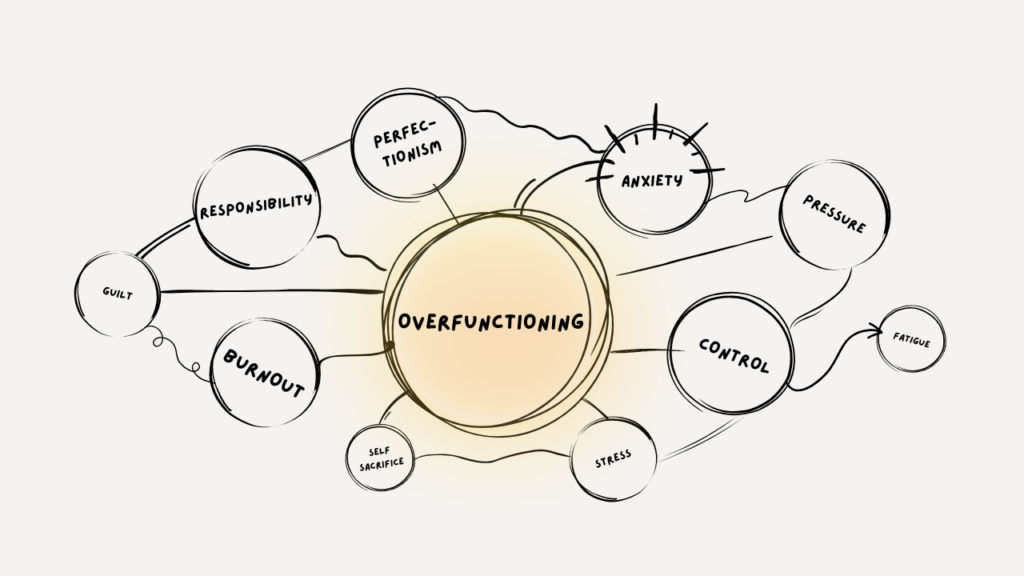Help your colleague fix a bug, remind the sales team to follow up with a prospect, write a detailed brief for the marketing intern, share a list of healthy recipes with your spouse, plan out a fun day for you and your friend this weekend… If your to-do list looks like this, you may be overfunctioning.
Overfunctioning refers to feeling overly responsible for family, friends, and coworkers, which leads to trying to proactively solve problems and taking on too many tasks, even if the other person is perfectly capable of doing those tasks themselves.
This behavior can paradoxically increase anxiety. By constantly taking on others’ responsibilities, we add pressure to keep everything running smoothly. Over time, overfunctioning can lead to burnout as we deplete our energy managing not only our own lives but also the life of others.

Why we Overfunction
While not an official psychological diagnosis, overfunctioning is closely linked to anxiety. We overfunction to manage our own worries, believing that taking on the responsibilities of others reduces the chance of something going wrong.
By constantly stepping in and feeling helpful, we also avoid facing our own uncertainties, relying instead on the sense of accomplishment from handling others’ tasks. This behavior provides a temporary sense of control.
Some overfunctioners may have learned early on that taking responsibility for others kept things “under control.” For example, children who managed responsibilities in chaotic family environments may carry those habits into adulthood.
Perfectionists are especially prone to overfunctioning, as they often believe that the best way to avoid failure is to manage everything themselves. This contributes to a cycle where overfunctioning feels necessary to maintain high standards.
Overfunctioning can manifest in a variety of ways. Below are examples of behaviors that might seem helpful on the surface but reflect a pattern of taking on others’ responsibilities. These can occur both at work and in your personal life:
- Planning every social outing so that everyone enjoys themselves.
- Taking on colleagues’ tasks to prevent potential mistakes.
- Reminding coworkers of deadlines they’re already aware of.
- Constantly forwarding useful research and information to others.
- Offering to double-check work done by others without being asked.
Most of these may seem fine in isolation, but they can quickly add up and create a cycle of self-imposed pressure that can negatively impact your mental health.
The Overfunctioning Inventory
To explore whether you might be overfunctioning, here are ten questions you can ask yourself. Take a notebook or open your favorite note-taking app. Or you can download a printable version of the inventory here.
- Do I often feel anxious when others are in charge of responsibilities I care about?
- Do I frequently take on tasks because I’m worried others won’t complete them properly?
- Am I regularly volunteering for extra tasks at work or in my personal life, even when I’m already busy?
- Do I feel a sense of relief or control after completing tasks for others?
- Do I often “fix” problems that others haven’t asked for help with?
- Do I find myself doing things for others because I think it’ll save time or avoid stress?
- Do I avoid delegating tasks because I’m concerned about the quality of others’ work?
- Do I regularly check up on people to make sure they’re following through on their commitments?
- Do I believe that I’m the only one who can manage certain responsibilities effectively?
- Do I feel a strong urge to step in during group tasks to ensure a positive outcome?
Next to each question, write a “1” if you answered yes and a “0” if you answered no. At the end, add up your score and multiply by 10 to get a percentage score. The higher the score, the more likely you are to be overfunctioning.
How to Deal With Overfunctioning
Overfunctioning can be insidious as it often hides behind the guise of overperforming. If you found that your score was high in the previous section, here are some strategies you can use to start shifting these behaviors.
Reflect on your patterns. Start by practicing metacognition to become aware of your overfunctioning behaviors. This can be done through journaling or a weekly review to identify situations where you’ve taken on too much.
Define your responsibilities. Clarify what’s truly yours to manage and what isn’t, for instance by using the MoSCoW method (Must, Should, Could, Won’t). Categorizing tasks this way can help you focus your efforts where they’re genuinely needed.
Set up formal check-ins. Instead of frequently checking on others out of worry, establish regular check-in points, like team stand-ups or a weekly date night with your partner. Creating these scheduled “containers” can reduce the urge to constantly monitor how others are doing.
Clarify where help is needed. Practice open communication with friends, family, and colleagues. Ask them directly where they feel your support has been helpful and where they would prefer to manage independently.
Practice the art of letting go. Remind yourself that things don’t need to be perfect, and give others the opportunity to handle tasks their way. Letting go may feel uncomfortable at first, but it will help you build trust in those around you and give you more time and energy for your own priorities.
Implementing these small changes and stepping back where you don’t need to be involved can lead to less anxiety, healthier relationships, and a clearer sense of focus in both your personal and professional life—basically functioning better by not trying to overfunction.
